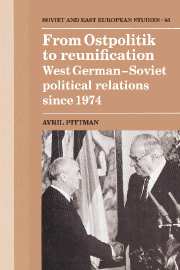Book contents
- Frontmatter
- Contents
- List of tables
- Preface
- Note on text
- Chronology
- Introduction
- 1 The Second World War and its aftermath, 1945–1974
- 2 Ethnic Germans
- 3 Berlin
- 4 The Federal Republic of Germany's relations with the German Democratic Republic
- 5 INF, Afghanistan and the post-Afghanistan period
- 6 Assessment of the Federal Republic of Germany's relations with the Soviet Union, 1974–1982
- 7 The Federal Republic of Germany's political relations with the Soviet Union after 1982
- Appendices
- Notes
- Bibliography
- Index
- Series list
Preface
Published online by Cambridge University Press: 12 October 2009
- Frontmatter
- Contents
- List of tables
- Preface
- Note on text
- Chronology
- Introduction
- 1 The Second World War and its aftermath, 1945–1974
- 2 Ethnic Germans
- 3 Berlin
- 4 The Federal Republic of Germany's relations with the German Democratic Republic
- 5 INF, Afghanistan and the post-Afghanistan period
- 6 Assessment of the Federal Republic of Germany's relations with the Soviet Union, 1974–1982
- 7 The Federal Republic of Germany's political relations with the Soviet Union after 1982
- Appendices
- Notes
- Bibliography
- Index
- Series list
Summary
With the signing of the Moscow Treaty in 1970 which led to the rapid and historic accommodation with the East (earning Willy Brandt the Nobel Peace Prize) and to the Allied Quadripartite Agreement on Berlin, FRG–USSR relations were very much to the forefront of world politics. The recent historic opening of the Berlin Wall and the reunification of Germany has meant that the world's attention has once again been fixed on the Federal Republic's political relations with the USSR.
This study is an examination of FRG–USSR political relations between 1974 and 1982. The study concentrates on the West German side of FRG–USSR relations in the ‘follow-on’ period to the innovatory ‘treaty’ period of Ostpolitik. It was a period when the overall climate of détente began to deteriorate, culminating in the Afghanistan crisis.
This was a period in which Chancellor Schmidt consolidated the achievements of the Brandt period, steering FRG–USSR relations through the difficult time of the late 1970s and early 1980s and developing FRG–USSR relations, putting them on the solid basis that they have today. It is a measure of the success of the period that when Schmidt fell from office in 1982, the CDU/CSU more or less continued Schmidt's foreign policy with no change, no change sometimes even in style. Indeed, whilst much credit must be given to the diplomacy of Chancellor Kohl and particularly to his FDP coalition partner, Foreign Minister Hans-Dietrich Genscher, the rapidity of accommodation with the Soviet Union in 1990 leading to the reunification of Germany – although due in large measure to the Soviet Union's desperate economic situation – must also be seen as a reflection of those foundations laid during the Schmidt period.
- Type
- Chapter
- Information
- From Ostpolitik to ReunificationWest German-Soviet Political Relations since 1974, pp. xi - xiiiPublisher: Cambridge University PressPrint publication year: 1992

